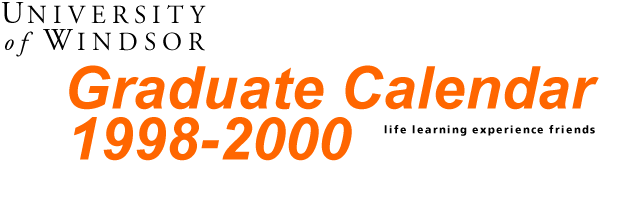|
6.3.1 COURSE DESCRIPTIONS
All courses listed will not necessarily be offered in every term. Courses
are normally three hours a week.
41-501. Microeconomics
An intensive review of the theory of the firm and consumer theory.
41-502. Macroeconomics
An intensive review of theories of the determination of aggregate output,
employment and price level.
41-503. Microeconomic Theory II
Additional topics in microeconomic theory.
41-504. Macroeconomic Theory II
Additional topics in macroeconomic theory.
41-510. Theory of International Trade
An introduction to the problem of international trade goods and services,
and the related issues of exchange rate determination and balance of payments
control.
41-516. Labour Economics I
The demand and supply analysis; human capital; trade unions and collective
bargaining; wage structures; labour mobility.
41-517. Labour Economics II
Employment and unemployment; wage adjustment; distribution of income;
selected policy issues.
41-519. Social Choice and Cost-Benefit Analysis
This course covers the problems of social choice and institutions of
collective decision making. Applications may include topics such as evaluating
public sector projects and the response to externalities.
41-531. Industrial Organization
A theoretical and empirical analysis of firms and markets.
41-541. Econometric Theory I
The general linear model, selected single equation problems, and an
introduction to simultaneous equations methods.
41-542. Econometric Theory II
Additional topics in econometric theory (Prerequisite: 41-541.)
41-543. Applied Econometrics
The specification, estimation and testing of economic models. Emphasis
will be on the classical linear regression model, the implications or violations
of its basic assumptions and diagnostic testing. (This course is not intended
for students who take 41-541.)
41-550. Monetary Theory
A survey of recent developments in the theory of money and monetary
control of an economy, in addition to selected topics.
41-560. Public Sector Expenditure
Selected topics in public expenditure theory such as public goods,
externalities, public choice, and bureaucratic behaviour.
41-561. Public Sector Finance
Optimal taxation, efficiency, equity, and fiscal effects of taxes;
tax structure, user charges, government debt and borrowing.
41-565. Economic Development
A review of selected theoretical and policy issues based upon recent
literature on the economic growth and development of less-developed economies.
41-575. Economics of Transition
This course studies the problems associated with significant changes
in the economic organization of an entire economy. Possible topics include
the role and effectiveness of common incentive systems and the effects
of an entrenched bureaucracy.
41-580. Models of Strategic Behaviour
A review of game theory showing how strategic reasoning can be used
as a tool in decision theory. Topics include solution concepts for Normal
form and Extensive form games, plus applications.
41-581. Mathematical Economics
The formal properties of selected economic models. Includes an examination
of the problems of existence, uniqueness and stability of solutions.
41-582. Selected Topics in Advanced Theory
An examination of the most recent literature on one or two selected
topics in theory.
41-590. Regional Economics
Theoretical and policy issues relating to large regions, including,
for example, distribution of wealth, distribution of productive resources,
and migration.
41-591. Urban Economics
Theoretical and policy issues relating to urban areas, including, for
example, urban growth and land use.
41-594. Special Studies in Economics
Research and reading course in a selected field approved by the Department.
41-796. Major Paper
Students are expected to attend the major paper seminar in at least
two terms.
Undergraduate senior courses, which may be assigned at the discretion
of the program coordinator to form part or all of the requirements for
the first year of the two-year graduate program, may be found in the Undergraduate
Calendar.( See also the program's homepage for additional information (http://web2.uwindsor.ca/faculty/socsci/eco/grad.html).
See also
Economics - Graduate Faculty
Programs of Study
|


